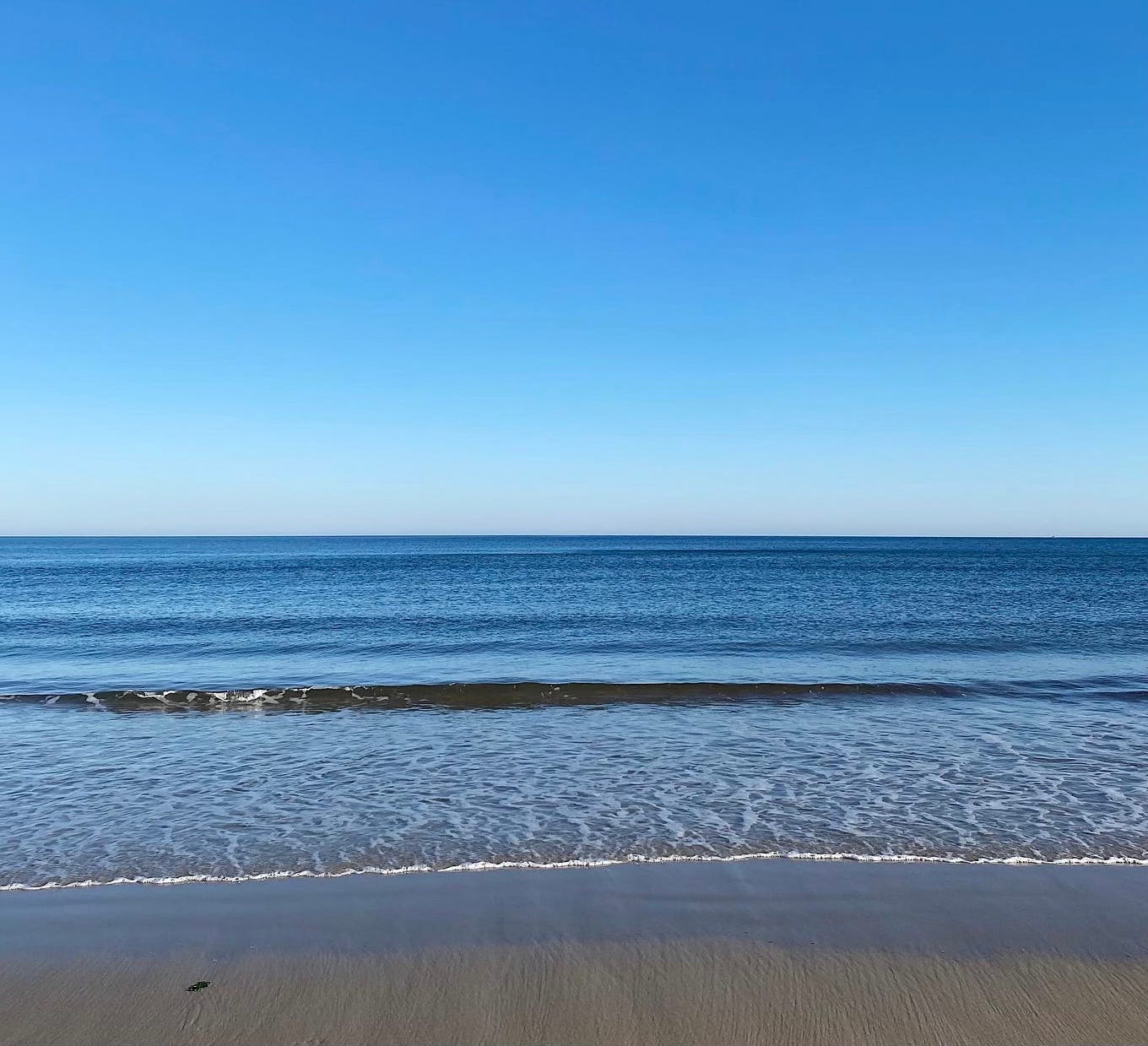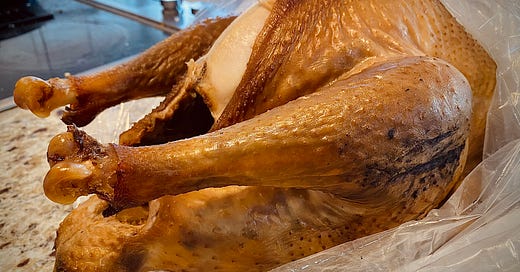Hope, Penitence, and Healing
Some thoughts on Ecclesiastes, Thanksgiving, gratitude, turkey, and corn
Wednesday, November 24
East Sandwich, Massachusetts
Hello, dear reader,
Last weekend, I officiated at the wedding of my friends Jessie and Dan. It’s such an honor, such a privilege, to bear witness in this way on such a momentous occasion. They chose a Scripture passage that is apt yet not too common—Ecclesiastes 4:9-12: “Two are better than one because they have a good return for their hard work. If either should fall, one can pick up the other. But how miserable are those who fall and don’t have a companion to help them up! Also, if two lie down together, they can stay warm. But how can anyone stay warm alone? Also, one can be overpowered, but two together can put up resistance. A three-ply cord doesn’t easily snap.”

Jessie and Dan have both been through some hard things, and as I thought about them and these verses, I kept returning to the resilient, tender hope that I saw both in them and in the book of Ecclesiastes. Here’s an excerpt from my homily:
In Hebrew, Ecclesiastes is called Qohelet. It means “someone who speaks to the gathered,” or, maybe, “teacher.” Tradition ascribes the book to King Solomon, but the text doesn’t say that; instead, we’re told that these are the reflections of a son of David and someone who has been king. Ancient literature, not just in Israel but among many peoples, often attributed works of writing to sage leaders so that they’d have credibility. If you’re a wise but random Joe, who’s going to pay attention to you? It wasn’t uncommon for writers to assume the name and voice of a leader, much like a novelist now might pen a work of historical fiction that sees the past through the eyes of a famed protagonist.
Whether Ecclesiastes was actually a download from the brain of Solomon or the work of someone who assumed that identity, we know that this is a pragmatist’s counsel. The writer seems weary at times, looking at the world and seeming to say, “How do we make sense of this? What am I supposed to do with this?” Qohelet doesn’t shy from naming life’s griefs. This is a word from the melancholy, thoughts from a clear-eyed philosopher who has been through stuff. This isn’t necessarily the person you’d want to run into at a cocktail party or sit next to at a wedding reception. If Eeyore had written a book of the Bible, this would be it. Where other parts of Scripture might be set in music as a soaring aria or a hopeful ballad or a symphony where a moody minor resolves into a triumphant major, Ecclesiastes could be summed up with a simple “womp, womp.”
Before any of you think this will be the most downbeat wedding sermon ever, let me try to redeem it: Ecclesiastes abounds with gorgeous hope—hope for those who have been wounded and scarred, hope for those who remain committed to making the best of what they have, hope for today and tomorrow and the day after that, hope for life together. The hope is found in the wrestling. The hope lives and breathes in its insistence on reckoning with the truth of human existence and the universal longing for meaning. The hope testifies to new possibilities.
Hope is different from optimism. Where optimism is confident that the sun will come out tomorrow or the day after that, hope admits that, actually, it might not be sunny; yet we can still make the best of it and persevere. Where optimism blithely says everything will be all right, often refusing to see sadness, hope recognizes reality. Where optimism craves the intoxication of happiness and sometimes inflicts that on others, hope listens well, honors complexity, and leans into the possibility of joy. Where optimism waits, hope works—nurturing, wondering, tending, feeding. Where optimism might shirk duty, hope asks thoughtfully, “What can we do? What’s the invitation here?”
What’s the invitation here? What is the invitation for each of us individually as well as all of us in our lives together, whether as a married couple or as a family or as a congregation or as a community? What possibilities come with each moment, with each twist and turn in our story together?
These questions are salient anytime, but especially as we approach Thanksgiving. It is one of my favorite holidays. Yet it is also a complicated day, for so many reasons. And hope invites us not to shy away from those complexities.
In 1863, when Abraham Lincoln issued a presidential proclamation declaring a national day of thanksgiving, he did so against the backdrop of a civil war that had not yet ended. He contrasted the grim reality of war with the beautiful perseverance he saw across the country. It’s notable that he called not just for thanksgiving and praise to God but also “humble penitence” as well as prayers for the Almighty “to heal the wounds of the nation.” We live in a different context, yes, and these are different times, yet we are no less in need of humble penitence and no less in need of healing.
Last year, on the 400th anniversary of the Pilgrims’ landing in what is now Massachusetts, my local paper here, the Cape Cod Times, ran a set of stories exploring the origins of and myths surrounding Thanksgiving. It included a story about what happened after the Pilgrims landed, a dissection of the standard Thanksgiving story, and a piece on the Abenaki chief Squanto. The entire package is worth a read.
That fraught history does not erase the reality that Thanksgiving is now a fixture on our calendar—and, as I said, I love it. Hope can handle both the good and the bad, inspiring us to ask how to observe an occasion well and what we can do to make it the best, truest version possible of itself.
For one thing, we can face the truth of history. We can repent of the erasure and the historical airbrushing that has happened. My little family will be marking Thanksgiving on Cape Cod, as we have nearly every year for the past 15 years. These are the traditional lands of the Wampanoag and Nauset peoples, who stewarded these soils and fished these waters for generations before European settlers arrived. While there are still five officially recognized Wampanoag tribes, the Nauset did not survive the diseases and weaponry brought in the 17th century.

For another, we can reconsider what we mean when we say “thanks.” I’ve been wondering whether I have too often resorted to shallow gratitude—a superficial kind of thanksgiving that borders on complacency. It’s not nothing to name what I’m thankful for, yet I often forget Lincoln’s call to collective penitence and communal healing. How deep does our gratitude go if it doesn’t move us to action on behalf of those who are less fortunate or to solidarity with those who are suffering? Shouldn’t the recognition of all that we’ve been given shift us into a different mode?
Which brings me back to the Ecclesiastes passage that Dan and Jessie chose for their wedding. It isn’t, at least in my reading, exclusively or even mainly about the marital relationship. Instead, I read it as being about friendship, about thoughtful and intentional neighborliness. Its wisdom comes most profoundly in the realization that it isn’t about harnessing strength or forging solace for me, myself, and I. Rather, it compels me to think about others—others who might crave companionship, others who might need warmth, others who find themselves at a breaking point, others who are struggling.
At its heart, Thanksgiving is—or, maybe, ought to be—about love. In gratitude to the God who is love, in appreciation for the God who chose to embody hope, we too can work towards becoming people of love and embodiments of hope. However you’re marking this occasion, my prayer is that you’ll glimpse joy and experience delight. May the grace that surrounds us be present to you—and may you find in these days some signs of active, fervent, and inspiring hope.
What I’m Cooking: We’ll be enjoying our Thanksgiving feast with our goddaughters, their parents, their grandparents, and their extended family this year. My job is to bring the turkey and the cornbread stuffing. (I’ll make the cornbread tonight, dry it out overnight, and then it’s just onions, celery, mushrooms, sage, broth, egg, salt, and pepper—oh, and lots of butter, all baked together for a while until the top gets a bit browned and the edges crispy.)
Ahead of Thanksgiving, we try to do some culinary counter-programming. Knowing what’s coming—smoked turkey, turkey ramen, turkey sandwiches, turkey fried rice—we steer our menu elsewhere. One favorite meal last week: local oysters, with an apple-shallot mignonette, followed by bouillabaisse, with mussels, clams, and cod, and some crusty bread to sop up the broth. The broth had fennel, celery, carrot, a little bit of tomato, and lots of onion and garlic. If I could redo this, I’d have more fish and fewer mussels, but you can only usually buy mussels in two-pound bags. Annoying.
Yesterday, I drove up to Boston with Fozzie to pick up a smoked, pasture-raised, heritage-breed turkey from a farmers market. The turkeys that we get at the supermarket, even the humanely raised ones, have been engineered for ginormous breasts, because of the American preference for white meat. I’ve been wanting to try a heritage-breed bird for a while now, and one bonus is that Stillman Quality Meats will smoke it for free upon request. I’ll report back!
It was chastening to listen to Kate Stillman, the farmer who raised the bird, as she described the costs of our broken food system and the stresses faced by the people who lovingly labor to feed us. The exhaustion was written all over her face. Surely Thanksgiving, when the dinner table heaves with abundance, means pausing for a moment to consider where our food comes from and how it is produced.
It was also humbling to open the food section of the paper this morning—yes, we still get the old-fashioned paper delivered each day—and read about the history of the corn that goes into my cornbread. “In that corn—written, in a sense, into its genetic code—is the story of the people who lived in Plymouth and throughout the Western Hemisphere before Europeans arrived,” the food critic Pete Wells writes. Surely Thanksgiving, when corn is right before our eyes and in our mouths, means stopping to recognize the truth of what we’re eating and the stories that it contains.
What I’m Listening to: This Sunday will be the beginning of Advent. Though I wish Advent were longer, as I wrote about last week, it is what it is, and we have what we have. My friend Amanda Held Opelt just released a lovely single that summons us to consider the reality of “the hurt in our hearts, the doubts in our heads” and points us gently toward the hope that will come with Christmas. It’s called Carol.
What I’m Reading: Eric Kim has quickly become one of my favorite food writers. Usually, he develops (excellent) recipes at the New York Times. But this past week, he put on his reporter’s hat and wrote a lovely, thoughtful piece about Friendsgiving.
And finally, a poem for you, from the lovely Maggie Smith. It feels right for our times. It feels right for this week, this year, this world. It’s called “Good Bones”: "This place could be beautiful,/ right? You could make this place beautiful.”
As always, I’d love to know what’s on your heart.
Happy Thanksgiving. I’m so glad we can stumble through all this together, and I’ll try to write again soon.
Yours,
Jeff





As usual, you have give me much to think about….what resonated the most today was your words on hope vs. optimism. My nephew is desperately ill and continues to lose ground after over a year of treatment for a rare cancer than cruelly targets young men. My sister is persistently cheerful, and I cannot find fault with how she manages her fear and stress, but you have just nailed the unease I feel when reading her posts. I am worried that she will collapse under the weight of her reality. Thank you for your words. I will read them again, as needed.
Jeff, thank you for this reminder: "Hope can handle both the good and the bad, inspiring us to ask how to observe an occasion well and what we can do to make it the best, truest version possible of itself." Amen! Thank you for your writing, and may you also have a restful Thanksgiving. 🙏